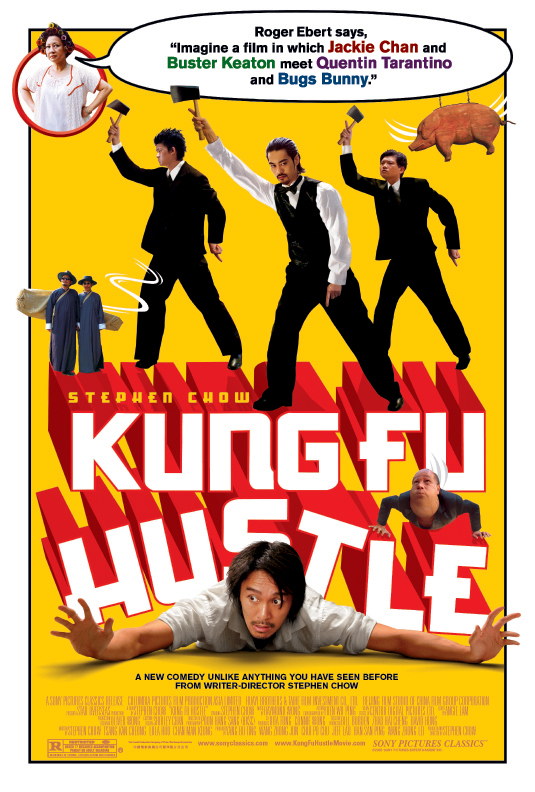by Kin-Yan Szeto
Jump Cut

This essay examines how the Hong Kong director Stephen Chow’s recent action comedy Kung Fu Hustle depicts an imaginary China in ways that commingle various historical and political meanings. The film thereby encourages viewers to reflect upon the past and present conditions of the Chinese nation-state and its people and culture, as well as on cinema’s own complex relations with history.[1][open notes in new window] I argue that the film deliberately evokes a 1940s Shanghai to play off its drama against the backdrop of Hollywood’s globalization and Hong Kong's political transformation from a former British colony to a Special Administrative Region of the People’s Republic of China in 1997. Kung Fu Hustle embraces the history of martial arts films and other popular genres to evoke an earlier period of Shanghai that is permeated with multiple temporal, spatial, political, and cultural contexts that shape and comment upon each other.
This analysis offers a contribution to historiography, or at least that of film, by following Michel de Certeau’s conception of historiography as a complex set of theories and methods for researching and presenting a history that always is contingent upon relations between knowledge and power as well as past and present. As de Certeau observed, history often assumes or depicts a simple “clean break between the past and the present,” but actually is shaped by more complex
“relations of knowledge and power linking [these] two supposedly distinct domains” (Heterologies 4).
The past always influences the present, and vice versa, while ideologies and politics mediate both. History is shaped by conscious and unconscious judgments about what constitutes legitimate or authentic sources, issues, and modes of presentation. More specific to film, this article also follows Robert Rosenstone’s observation that cinema tends to create a complex representation of history that blends fact and fiction
“through poetic overlays of sounds, images, words and ideas” (213).
Seeing should not simply be believing, as all images are mediated before, during, and after they are created. Following and expanding upon these notions, this essay examines the politics that govern Kung Fu Hustle’s assumptions and agendas in structuring relations between the present and the past. I critically explore the socio-political, economic and cultural discourses determining the historiography of an imaginary 1940s China as presented in this film. And I also note how the film contemplates, if less overtly, the new configuration of the Chinese nation-state after the Hong Kong handover. As part of its complex blending of historical contexts and political concerns, Kung Fu Hustle combines conventions of the Hong Kong martial arts film with other genres or modes of filmmaking including science fiction, gangster, western, slapstick and animation. These genre conventions together lead us to reflect on filmic interactions and translations between different geo-political spaces — Hong Kong, the Mainland and Hollywood. By analyzing Kung Fu Hustle from a transnational perspective, this article examines how the film interconnects and is shaped by the past and the present, the near and the distant, and fact and fiction as well as the political connotations involved in the writing of history. It proposes a new understanding of the politics of historiography in post-1997 Hong Kong, with broader implications for film and for history more generally.
To Read the Rest of the Essay
No comments:
Post a Comment